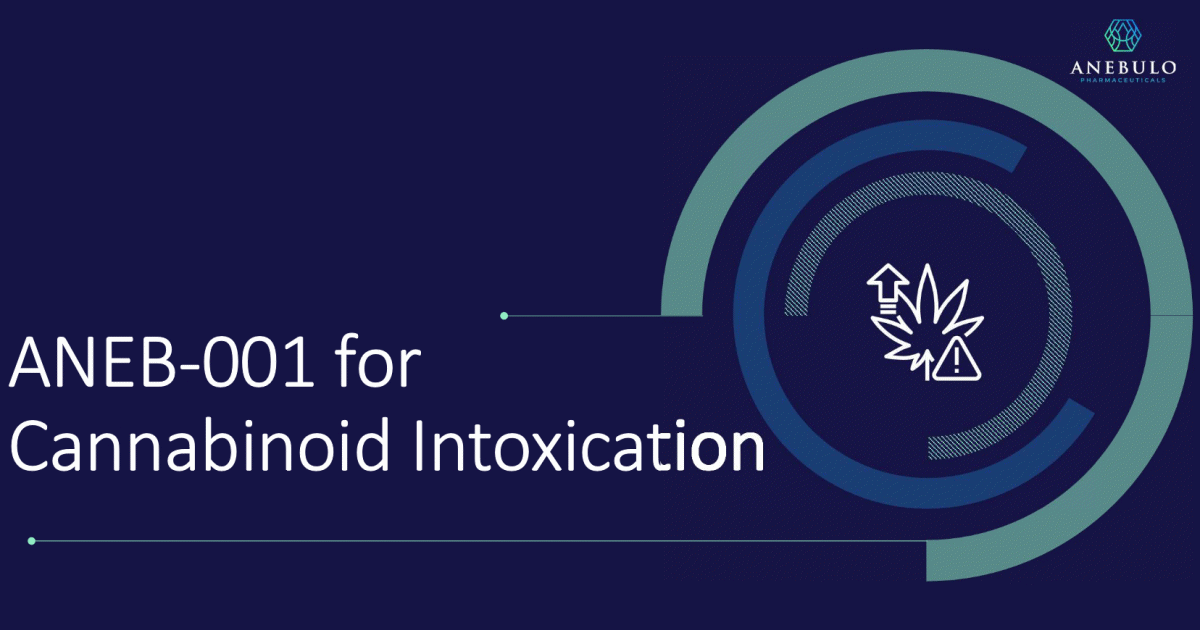As legalization expands and the marketplace sees the introduction of powerful new products, health officials are keeping a close watch on cannabis-related emergency room visits. Anebulo Pharmaceuticals, an Austin, TX-based clinical-stage biopharmaceutical company, announced this week encouraging data from its clinical trials evaluating the potential of a drug called ANEB-001 to treat acute cannabinoid intoxication (ACI) emergencies.
According to the National Institute of Health, cannabis-related emergency room visits by youths aged 10-24 years increased almost fivefold from 2003 to 2017, with increases in severity and hospital admissions. There is currently no medical treatment approved to alleviate the symptoms of ACI. Symptoms of ACI can include increased somnolence, impaired cognition and perception, disorientation, anxiety and acute psychosis.
“The number of individuals with cannabinoid related intoxication visiting our emergency departments is clearly on the rise,” said Dr. Andrew Monte M.D., Ph.D., Professor of Emergency Medicine & Medical Toxicology, University of Colorado Denver-Anschutz Medical Center. “Patients are coming from multiple settings including first-time users taking small doses of THC, adults and children inadvertently ingesting powerful THC gummies, and regular users unintentionally overdosing on new and more powerful THC products. Introducing an effective cannabinoid antidote into our treatment options would represent a significant improvement in how we can manage these patients”
The ties that bind
Anebulo says NEB-001 is being developed with the intent to quickly and effectively reverse the negative effects of cannabinoid intoxication. ANEB-001 is a potent, small molecule cannabinoid receptor antagonist with a high affinity for the human CB1 receptor. It is the CB1 receptor that binds with the primary psychoactive ingredient of cannabis sativa — delta-9-tetrahydrocannabinol, better known as THC. Anebulo’s trials suggest that ANEB-001 can be effective in reversing the symptoms of cannabinoid intoxication within 1 hour of administration.
Anebulo’s 60-subject randomized, double-blind trial was designed to evaluate the effectiveness of a single dose of ANEB-001 in treating healthy subjects challenged with delta-9-tetrahydrocannabinol. All subjects were given a single oral dose of 10.5 mg THC and then treated with single oral doses of 50 mg ANEB-001, 100 mg ANEB-001, or placebo.
The data demonstrated a highly statistically significant reduction in key symptoms of ACI, with only 10% of subjects in the 50 mg ANEB-001 group and 30% in the 100 mg group reporting feeling high, as compared to 75% of subjects in the placebo group. Subjects treated with a placebo responded they felt stronger THC effects: Feeling high, decreased alertness, increased body sway and increased heart rate. ANEB-001 was well tolerated in healthy volunteers, with preliminary safety information showed all adverse events were mild and transient — except for one subject who experienced moderate nausea and vomiting.
Advertisement
“We believe this proof-of-concept trial demonstrates ANEB-001’s potential to reverse the symptoms of ACI for many of the five thousand cannabinoid intoxicated individuals visiting our emergency departments in the United States on a daily basis,” said Simon Allen, CEO of Anebulo. “We believe marijuana legalization and greater consumer access to cheaper and higher potency THC products will continue to increase the incidence and severity of emergency department visits related to cannabinoid intoxication. With no FDA approved therapy, individuals intoxicated with cannabinoids have few treatment options and may require expensive follow-on interventions for neuropsychiatric complications such as anxiety and acute psychosis.”
Based on the encouraging data from Part A, the company plans to initiate Part B of the study later this year. Submission of an Investigational New Drug application for ANEB-001 to initiate U.S. trials is anticipated by the end of 2022. For further information about Anebulo, please visit www.anebulo.com.
 Anebulo Pharmaceuticals is developing its ANEB-001, a competitive CB1 antagonist, to quickly reverse the negative effects of cannabinoid intoxication within one hour of administration. PHOTO COURTESY ANEBULO
Anebulo Pharmaceuticals is developing its ANEB-001, a competitive CB1 antagonist, to quickly reverse the negative effects of cannabinoid intoxication within one hour of administration. PHOTO COURTESY ANEBULO















